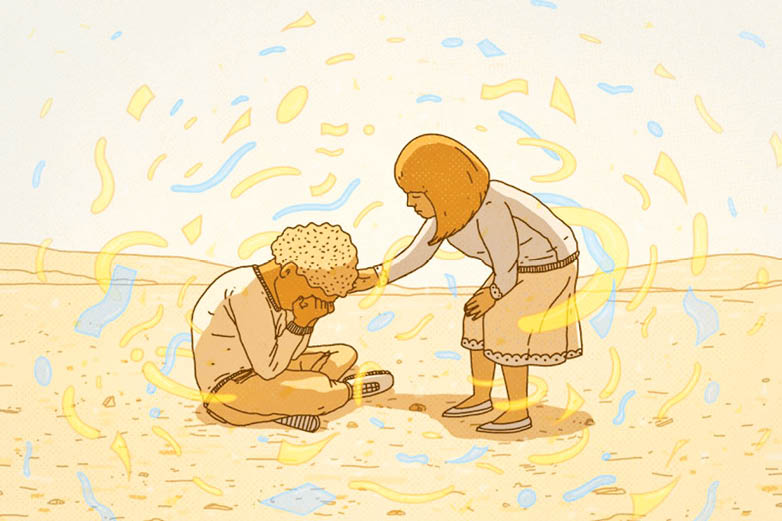This Shahenshahi New Year, let’s co-create with Ahura Mazda and with His Wisdom, a kinder and more loving world to live in. Let this be a promise we make to ourselves individually and collectively, as a community. Let us resolve to make this goal an attainable purpose of our daily living. Let this not just remain a good thought. Let us endeavor to transmute this good thought into good words, which in turn will inspire us towards good, positive action.
 First, Avoid Harm: Primum non nocere is a Latin phrase meaning, ‘first, do no harm’. This is a commonly taught principle in medical institutions; in fact, the Hippocratic Oath taken by doctors, promises they will abstain from doing harm to their patients. This principle must be imbibed by us all, not just doctors. In Zoroastrian theology, every good creation – the sky, water, earth, vegetation, animal or human being – is of great value because these are the six good creations of Ahura Mazda. In particular, human life and human dignity, regardless of social or economic status or accomplishments (or the lack of it), is sacred, from the moment of conception to the moment of death. It’s also why virtually every religion, including ours, regards homicide as the worst crime one human can inflict on another. To harm or destroy another person is to assault the very image and element of divinity represented by and within that person.
First, Avoid Harm: Primum non nocere is a Latin phrase meaning, ‘first, do no harm’. This is a commonly taught principle in medical institutions; in fact, the Hippocratic Oath taken by doctors, promises they will abstain from doing harm to their patients. This principle must be imbibed by us all, not just doctors. In Zoroastrian theology, every good creation – the sky, water, earth, vegetation, animal or human being – is of great value because these are the six good creations of Ahura Mazda. In particular, human life and human dignity, regardless of social or economic status or accomplishments (or the lack of it), is sacred, from the moment of conception to the moment of death. It’s also why virtually every religion, including ours, regards homicide as the worst crime one human can inflict on another. To harm or destroy another person is to assault the very image and element of divinity represented by and within that person.
Words Can Harm Or Heal: We can be harmed, even destroyed, not just with weapon or poison, but also with toxic words. Words are powerful. They can make us feel loved and valued or alienated and unappreciated. Words can inspire and motivate, or leave a person hurt and demoralized. Words can change lives for the better, change prejudiced minds, uplift, educate, heal, elicit feelings of immense love and bring joy. On the flipside, words can also destroy self-esteem, break hearts, devastate the mind, and fracture relationships. Therefore, choose what you say carefully – your words can harm as much as they can heal!
Disallow Others’ Opinions To Affect You: We often allow other people’s opinions to not only hurt us, but also define us. The truth is, it doesn’t matter what others think or say of us. Their opinion is often based on their own experiences, prejudices and clouded lenses through which they see us and the world around them. Their opinion should not influence our self-esteem or self-worth or who we aspire to be. Never let others disturb your inner peace. You and you alone, know your true worth, so be proud (not arrogant) and love yourself and your life. Your life is about the choices you made and will make. Don’t let others cloud your choices or the way you want to live your life. Whose life is it anyway?
Love And Be Loved: As per Zoroastrian texts, Ahura Mazda did not create human beings because He was lonely or needed something to do. We were created to bring about perfection (Khordad or Avestan Havratat) to our perfecting material world. Being Ahura Mazda’s final and best creation also implies that human beings were created to build harmonious relationships with all other good creations. At the very core of every human, lies the most fundamental need – to love and to be loved. To love Ahura Mazda as a ‘Friya’ (a loving friend) is central to Zarathushtra’s message in the Gatha. As Ahura Mazda’s loving friends, we are expected to emulate His qualities of love and friendship with wisdom. The simple but profound belief in ‘Good Thoughts, Good Words, Good Deeds’ is ingrained in every Zoroastrian from early childhood. In addition to that, Asho Zarathushtra’s message, ‘Happiness is best attained by making others happy’, completes the formula of positive and purposeful living.
Kindness And Compassion: Fundamental human values, Kindness and Compassion shape relationships – inter-personal as well as with the community. These two values alone can bring peace, harmony and happiness to the world. The difference between kindness and compassion, is that kindness is an action while compassion is a feeling for another living being that leads to action. An act of kindness is possible even without any feeling towards another person. But compassion is about empathy and relating to another’s needs or emotions. In the Pazand Dua Tandorosti we pray, ‘Ba nāme yazade bakhshāyandehe bakhshāyashgare meherbān’, which freely translated, recognizes the Supreme Divinity as Giving, Forgiving and Kind or compassionate; and these indeed are qualities we must attempt to cultivate in our own lives!
Giving: While wealth is considered positive, one does not necessarily have to be wealthy to be philanthropic. Many times, it is the middle-class which gives in greater proportion to its wealth as compared to the rich; and often, even the so-called poor, give far more than their means. Philanthropy or charity or simply stated, ‘giving’, is not just about giving money – it is about being compassionate and sharing your other resources like your skills, your talents, encouraging or loving words and more importantly, your time, which is our most valuable resource. Such values are best inculcated at home and it is often a culture that runs in the family or a community. A truly generous or charitable person is generous in his/her thinking and charitable in his/her understanding and tolerance of others. One should also aspire to be generous in giving compliments where necessary or well deserved. It brings out our best side while encouraging us to strive for betterment.
Wise Use Of Wealth: Money can buy comfort, but not necessarily happiness. Generating wealth is good, but its true value lies in its proper application. Wealth should be used to create a better world. But, first we must find positive purpose – the means will follow. In our view, ‘poverty of purpose’ is worse that ‘poverty of the purse’. From a religious viewpoint, Zoroastrians consider poverty, suffering and want as an affliction of evil. To alleviate poverty, disease and suffering is not only a religious duty, but an act of spiritual merit, depriving ‘evil’ of sustenance.
The Pahlavi Dinkard recommends cultivating the five virtues of religious merit, namely, Truthfulness, Charity, Skill, Endeavour and Giving encouragement to others in good deeds. In the Handarz literature, Aturput (Adarbad) Mahraspand, the High Priest of the Sasanian King, Shapur II, speaks of three kinds of charity – To give without being asked or requested to give; to give immediately on being asked or required to give; and to give at the promised time, if one has promised. Aturput Mahraspand adds that charity is good when one holds no expectations from the receiver and that charity or acts of kindness should never be done for personal gain or aggrandization.
Be Kind For The Sake Of Kindness: Being kind not just positively impacts others, but also those who practice kindness in day-to-day life. While Princess Diana believed that one should carry out random acts of kindness, with no expectation of reward, safe in the knowledge that one day someone might do the same for you, Rabbi Harold S. Kushner felt that one should do things for others because of who we are.
We should be kind because to be kind is good, it feels good and does good, both, to the giver and the receiver!
- Why Pray In A Language We Do Not Understand? - 29 March2025
- Celebrate Nature’s New Year With Purity And Piety of Ava - 22 March2025
- Celebrate Navruz 2025 With The Spirit Of Excellence And Wholesomeness - 15 March2025
